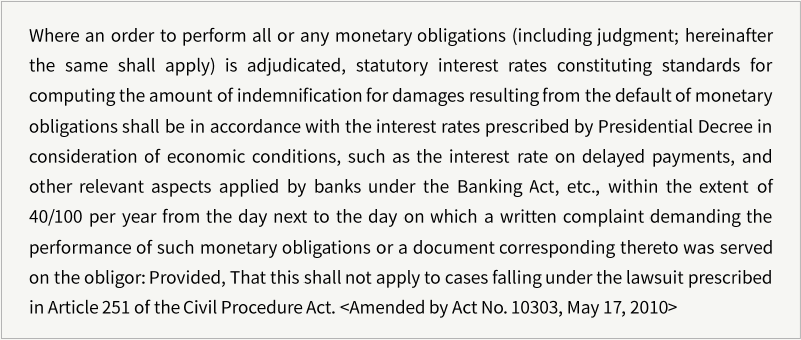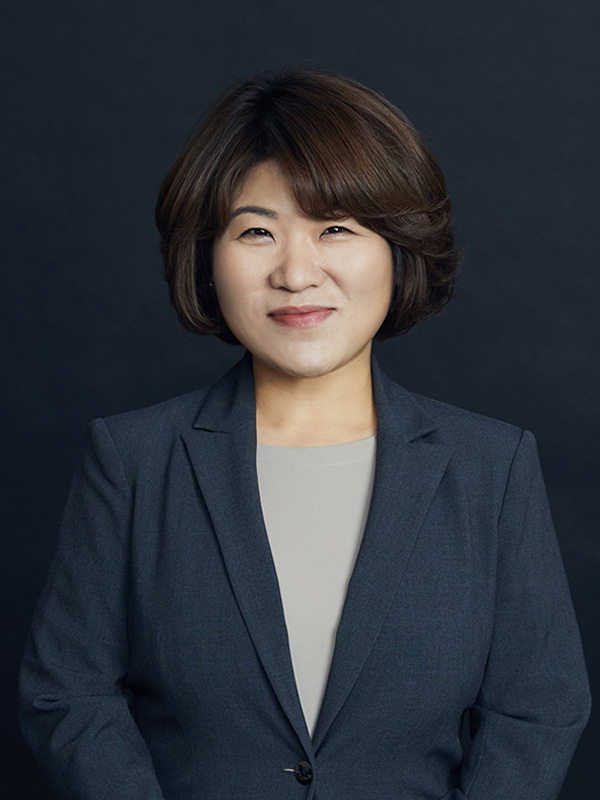Foreign parties to a dispute in Korea may find themselves in unfamiliar and surprising territory when it comes to post-judgment interest. A unique feature of the Act on Special Cases Concerning Expedition, Etc. of Legal Proceedings (the “Act”) is that post-judgment interest accrues from the day a defendant is served with the complaint, and not when judgment is rendered or confirmed. Moreover, since the Act’s objective is to expedite legal proceedings involving payment disputes, the Act stipulates very high post-judgment interest rates; the aim is to incentivize parties to resolve their disputes quickly to avoid the burden of paying substantial interest on outstanding payment obligations. Korea’s high post-judgment interest rate is thus an important consideration in evaluating litigation strategy and the cost of time spent before Korean courts.
It is still largely unsettled as to whether Korean courts will apply the Act’s high post-judgment interest rate in judgments enforcing arbitral awards. However, the courts have not ruled out the Act’s application, observing that at least for arbitral awards regarding Korean law-governed payment obligations, the governing law of the dispute (i.e. Korean law) should be applied to decide the scope of indemnification for damages owed for the breached payment obligations, since default interest is ancillary to the underlying payment obligation.
Key Features of the Act
The purpose of the Act is to “prevent delay in litigation, to ensure prompt determination of parties’ rights and obligations, and facilitate the settlement of disputes” (Article 1 of the Act).
Further, Article 3(1) provides that:

Initially, the statutory rate set by Presidential Decree was 25%. It was lowered to 20% in 2003, and reduced again to 15% in 2015. For all cases that were “open for argument” as of June 1, 2019, a further revised rate of 12% applies, which is the current statutory “post-service” interest rate. While some pundits say that the reduced rates are not sufficient to facilitate early resolution of lawsuits, others have expressed concern that high rates may deter meritorious appeals and restrict access to due process. According to Korea’s Department of Justice, the latest adjustment to 12% in 2019 was necessary to effectuate the purpose of the Act amidst the changed economic environment of diminishing interest rates. According to the Korea Federation of Banks, default interest rates ranged between 11% and 15% in 2019.
Given that the federal post-judgment interest rate in the United States is less than 1% as of May 2021 (see https://www.casb.uscourts.gov/post-judgment-interest-rates; https://www.nyeb.uscourts.gov/post-judgment-interest-rates), even the reduced 12% rate could be a significant burden to unwary foreign litigants faced with monetary judgments rendered against them in Korea. And considering that in many jurisdictions (e.g., France) statutory post-judgment interest accrues from the date of the decision, computing interest from the beginning of a lawsuit could be a significant deterrent to delay tactics.
Applicability to International Arbitrations Seated in Korea
It is a generally accepted practice in international arbitration for arbitrators to look to the substantive law governing the parties’ claims when deciding the appropriate interest rate (Gary B. Born, International Commercial Arbitration [2009] at 2503). But, while this makes sense and is well-precedented for pre-award interest (e.g., Korean Supreme Court Decision 89DaKa20252 dated April 10, 1990), it is not so for post-award or post-judgment interest. Rather, logic dictates that tribunals should look to the law of the jurisdiction where an award would be enforced to determine the appropriate post-award interest rate (John Y. Gotanda [1999] Supplemental Damages in Private International Law, 73-75 (“Once an arbitral award is enforced in a country as a court judgment, interest then accrues at the domestic rate applicable to a civil judgment in that country, instead of at the rate set forth in the original award”)). The conundrum becomes more complex when the governing law of the dispute is different from the lex arbitri, and the lex arbitri is different from the law of the jurisdiction where the award should or could be enforced.
It is in this perplexing context that the applicability of the Act becomes an important legal issue for international arbitrations seated in Korea or dealing with claims governed by Korean law – precisely because of the uniquely high statutory interest accruing from the date of service of the complaint. It is thus worth tracking and analyzing how Korean courts have treated arbitral decisions which include interest awards based on the Act.
Thus far, precedents are scarce. But despite the clear language of the Act which provides that its purpose is to prevent delay in “litigation” (Article 1) and applies to “judgments” ordering satisfaction of payment obligations (Article 3), Korean courts have refused to accept the argument that the recognition of “arbitral” awards should be denied on grounds that application of the Act to arbitral proceedings would violate Korean public policy (Supreme Court Decision 99Da13577 dated April 10, 2001; Supreme Court Decision 89DaKa20252 dated April 10, 1990).
Moreover, the Act may apply to international arbitration proceedings where the governing law of the payment obligation is Korean law. According to the Supreme Court, default interest is ancillary to the underlying payment obligation and should be decided according to the governing law of the underlying dispute. The Supreme Court further held that although the Act’s purpose is procedural in nature – i.e. to expedite dispute resolution – its substance goes to the determination of the scope of indemnification for damages owed for breached payment obligations (Supreme Court Decision 95Da34385 dated May 9, 1997; Supreme Court Decision 2009Da10249 dated January 27, 2011).

